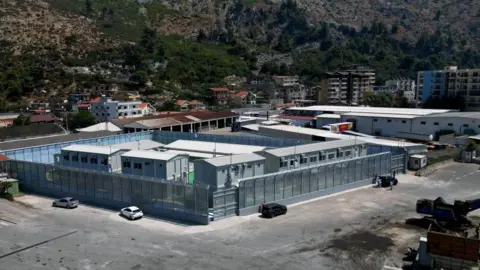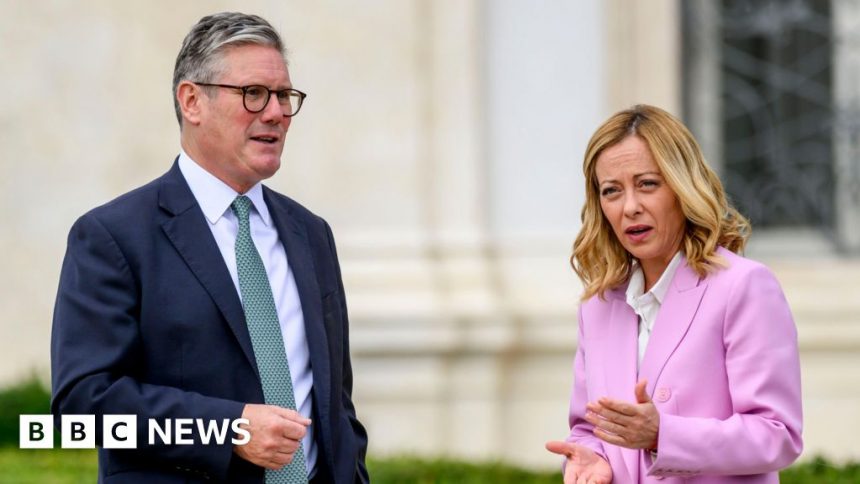Starmer looks to Italy on how to stop migrant boats
 Getty Images
Getty ImagesSir Keir Starmer has suggested he will study Italy’s asylum processing deal with Albania as part of a “pragmatic” approach to tackling migrant boats crossing the English Channel.
Speaking to reporters, the prime minister said he had discussed the “concept” of Italy’s deal during talks in Rome with Italian counterpart Giorgia Meloni.
Meloni said Sir Keir had shown “great interest” in the planned scheme, under which some migrants rescued in Italian waters will be sent to the Balkan country to have their asylum claims processed.
Sir Keir also said he was interested in Italy’s model of paying north African countries to do more to stop boat crossings.
He added that deals with Tunisia and Libya “appears to have had quite a profound effect” in helping Italy cut the number of migrant arrivals.
The Labour government has scrapped a Conservative plan to send asylum seekers on a one-way ticket to Rwanda, where they would only be able to apply for refugee status in the east African nation.
But it has indicated an interest in schemes under which migrants crossing the English Channel could have their applications to stay in the UK processed abroad.
Italy’s right-wing government, led by Meloni since October 2022, is not a natural political ally for Labour leader Sir Keir, but he has expressed an interest in learning from its tactics to counter illegal migration.
Under its five-year deal with Albania, agreed last year, some migrants rescued by the Italian coastguard will be sent there to have their asylum claims processed in two centres funded and managed by Italy.
In a key difference with the Rwanda plan, those that succeed will come to Italy as refugees. Those whose applications are rejected will be detained in Albania until they can be returned to their home countries.
Only migrants from countries deemed safe by Italy – whose claims are more likely to be rejected – will be sent, whilst pregnant women, minors and other categories of vulnerable people will be excluded.
 Getty Images
Getty ImagesThe scheme, which the Italian government says will cost €670m (£564m), was meant to start in August but has been delayed, with Meloni saying it will be “few weeks” before it gets going.
It has been criticised by some right groups, who have questioned how failed asylum claims could be properly appealed and argued it could leave people in legal limbo.
En route to Rome, Sir Keir said he was “interested” in learning about the scheme and later confirmed he had discussed it during his meeting with Meloni.
The prime minister also discussed the model with Albanian counterpart Edi Rama during a summit of European leaders in July, when he said he wanted to “look at what works”.
Speaking at a press conference, Sir Keir said the impact of Italy’s Albania deal was not yet clear because the scheme had yet to begin operating, but he had discussed “the concept of it” with Meloni.
It is not clear, however, how likely it is such a deal could be replicated.
Albania, which is seeking to bolster its longstanding application to join the EU, has suggested that such a deal is only with Italy, its closest ally in Europe.
‘British pragmatism’
Sir Keir also underlined he was also interested in Italy’s agreements with north African countries, which have emerged as important hubs for migrants attempting to make the journey to Europe.
Alongside the EU, Italy has granted Tunisia financial aid for education and energy projects in return for greater efforts to stop migrants crossing the Mediterranean.
It has an agreement with the UN-backed Libyan government, under which Italy trains and funds the coastguard to intercept migrant boats.
Both of those deals have proved controversial, attracting criticism from rights groups for the treatment of those stopped from crossing.
Sir Keir told reporters this work to stop arrivals “upstream” was a “more likely” factor than the Albania deal in explaining a 64% drop this year in the number of people crossing to Italy from Africa.
“Preventing people leaving their country in the first place is far better than trying to deal with those that have arrived in any of our countries, so I was very interested in that,” he added.
“In a sense, today was a return – if you like – to British pragmatism.
“We are pragmatists first and foremost. When we see a challenge we discuss with our friends and allies the different approaches that are being taken [and] look at what works.”
However, some Labour backbenchers have criticised their leader for seeking inspiration from Meloni’s government.
Liverpool Riverside MP Kim Johnson called it “disturbing,” whilst Nottingham East’s Nadia Whittome said the UK should not be “taking lessons” from Italy.






